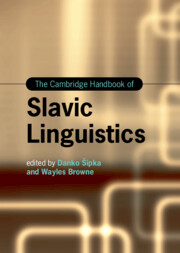Book contents
- The Cambridge Handbook of Slavic Linguistics
- Cambridge Handbooks in Language and Linguistics
- The Cambridge Handbook of Slavic Linguistics
- Copyright page
- Contents
- Figures
- Tables
- Contributors
- Introduction
- Part 1 Prosody and Phonology
- Part 2 Inflectional and Derivational Morphology
- Part 3 Syntax
- Part 4 Lexicon
- Part 5 Sociolinguistic and Geographical Approaches
- 26 Sociolinguistic Variation in Slavic Languages
- 27 False Cognates
- 28 Dialectal Fragmentation
- 29 Language Contacts
- 30 The Slavic Literary Micro-Languages
- 31 Heritage Language Forms
- 32 Scripts
- 33 Orthographies
- Part 6 Experimental and Quantitative Approaches
- Name Index
- Subject Index
- References
31 - Heritage Language Forms
from Part 5 - Sociolinguistic and Geographical Approaches
Published online by Cambridge University Press: 16 May 2024
- The Cambridge Handbook of Slavic Linguistics
- Cambridge Handbooks in Language and Linguistics
- The Cambridge Handbook of Slavic Linguistics
- Copyright page
- Contents
- Figures
- Tables
- Contributors
- Introduction
- Part 1 Prosody and Phonology
- Part 2 Inflectional and Derivational Morphology
- Part 3 Syntax
- Part 4 Lexicon
- Part 5 Sociolinguistic and Geographical Approaches
- 26 Sociolinguistic Variation in Slavic Languages
- 27 False Cognates
- 28 Dialectal Fragmentation
- 29 Language Contacts
- 30 The Slavic Literary Micro-Languages
- 31 Heritage Language Forms
- 32 Scripts
- 33 Orthographies
- Part 6 Experimental and Quantitative Approaches
- Name Index
- Subject Index
- References
Summary
The chapter presents a broad overview of current research on the formal properties of Slavic languages developing in heritage language settings. Representative studies on heritage Russian, Polish, Bulgarian, Ukrainian, Serbian, and Croatian are synthesized along the following grammatical dimensions. In the nominal and verbal domains, I review properties of the heritage Slavic case and gender systems and the encoding of temporal distinctions through aspect and tense morphology. At the levels of sentence organization and discourse structure, I survey word order change pertaining to the syntax of clitics and the placement of clausal constituents to convey information-structural distinctions. The concluding discussion identifies the key overarching principles underlying the changes attested across the surveyed linguistic varieties and outlines directions for future studies in heritage Slavic linguistics.
- Type
- Chapter
- Information
- The Cambridge Handbook of Slavic Linguistics , pp. 657 - 674Publisher: Cambridge University PressPrint publication year: 2024



